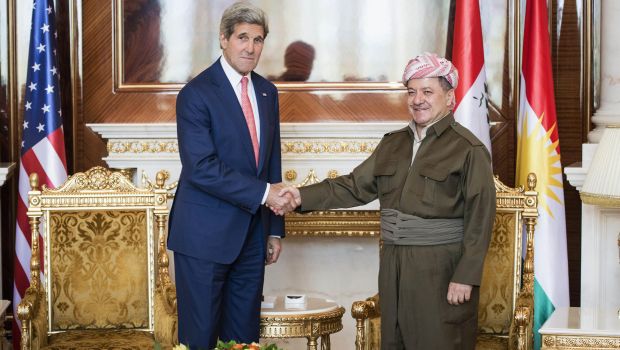
Kurdistan Regional Government President Massoud Barzani (R) greets US Secretary of State John Kerry at the presidential palace in Erbil, the capital of northern Iraq’s Kurdistan autonomous region, on June 24, 2014. (Reuters/Brendan Smialowski)
Baghdad, Asharq Al-Awsat—US Secretary of State John Kerry is meeting with Iraqi Kurdish leaders in Erbil on Tuesday, calling on the semi-autonomous Kurdistan Regional Government (KRG) to stand with the embattled central government in Baghdad against the advancing Islamic State of Iraq and Syria (ISIS).
KRG President Massoud Barzani told the US Secretary of State that Washington’s attempts to form a broad, “multi-sectarian” government in the country to confront the ISIS threat will likely not succeed.
“We are facing a new reality and a new Iraq,” Barzani said, blaming Maliki’s “wrong policies” for the latest violence and calling on the prime minister to step down.
Local media on Tuesday reported that Barzani was set to formally propose the idea of Kurdish secession from Iraq, amid fears of ISIS’s advance in the country and political divisions over Maliki’s bid to secure a third term in office. During his meeting with Kerry on Tuesday, Barzani said it was “very difficult” to imagine Iraq staying together.
Kurdish Peshmerga forces have been successful in preventing ISIS capturing Kurdish territory, and have taken control of Kirkuk from both the Sunni militants and retreating government forces. Kirkuk, viewed by Iraqi Kurds as their historic capital, has long been a bone of contention between Erbil and Baghdad.
Kerry acknowledged that Kurdish security forces have been “critical” in restraining the advance of ISIS. “This is a very critical time for Iraq, and the government formation challenge is the central challenge that we face,” he said in Erbil.
This is Kerry’s second visit to Iraq in as many days, and it comes after the US Secretary of State met with Prime Minister Nuri Al-Maliki in Baghdad on Monday, during which he called on the country’s leadership to form a government as soon as possible and pledged “intense and sustained” US support for Iraq.
Iraq’s divided political leaders have moved to unify their ranks as ISIS continues to advance towards the capital, with Islamic Supreme Council of Iraq (ISCI) leader Ammar Al-Hakim and Iraqi parliamentary speaker Osama Al-Nujaifi appearing alongside Maliki during his meeting with Kerry.
Nujaifi, who heads the Sunni-led Mutahidoun coalition, had been a staunch critic of the Shi’ite prime minister, while prominent Shi’ite leader Ammar Al-Hakim had also previously called on Maliki to step down.
State of Law coalition MP Khalid Al-Asadi told Asharq Al-Awsat: “Following the emergence of the threat represented by ISIS and their backers, the National Alliance is seeking to unify its position.”
The National Alliance is the Shi’ite-led electoral coalition that had previously secured Maliki’s second term in office; however, this alliance had been functionally annulled in the run up to Iraqi parliamentary elections earlier this year following disagreements over Maliki’s premiership. Prominent Shi’ite Alliance leaders Moqtada Al-Sadr and Ammar Al-Hakim had earlier called for Maliki to step down.
Asadi denied that Kerry had called on Maliki to step down to allow the formation of a multi-sectarian government, saying that the prime minister is capable of forming a national consensus government such as this.
“Kerry did not talk about this issue with Maliki and the Americans are now aware that ISIS represents a threat to their interests. Iraq, for its part, welcomes any international assistance from any party,” he said.
The Sadrist Movement, which had also strongly criticized Maliki prior to the ISIS advance, has stressed the importance of securing Iraqi unity. Sadrist spokesman Jawad Al-Jabouri told Asharq Al-Awsat: “We reject the disintegration of the state, whatever the reason.”
He said: “The priority is to confront terrorism and so we must not shuffle the cards at this point. The Sadrist Movement’s position regarding the formation of the government, which must be a national unity government in which all parties play an effective role, is a fixed position that we will not compromise on.”
“The same goes for our position [rejecting] a third term [for Maliki], and this is something that we will discuss further during our talks with the other parties,” he added.

It would not be wise to use the Kurds again as Guinea Pigs in the endless and useless game of attempting to remake a strong central government run by a dictator. Especially with all the natural resources under such a dictators arms. Does the west like more 9-11s? The Kurds have shown that they can and have been a good ally of the western democracies and have no ambitions beyond their borders. Any sense and sensibility would not risk disturbing what the kurds have worked to build over the past decade.
Decision makers should not be mislead by misinformants and should know very clearly that the Kurds rejoined Iraq voluntarily after the collapse of Saddam and since then, they have tried their best to go by a constitution that the majority of the Iraqis voted for. The Arab Iraq, irrespective of who runs it, has run away from implementing the constitution.
I am sure that a redrawing the map of that area will inject stability and prosperity for all sides contrary to what misinformants view as the end of the world if that happens.